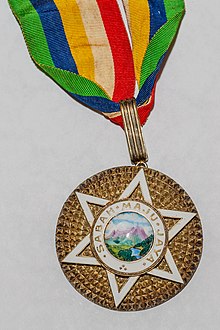Illustrious Order of Kinabalu
The Most Illustrious Order of Kinabalu , Malaysian Darjah Yang Amat Mulia Kinabalu (dts. " The Most Exalted Order of Kinabalu"), is an order of merit of the Malaysian state of Sabah , which was created in 1963 by a parliamentary resolution and with which people are awarded to this day, " who have rendered the state creditable services ”.
State Honors Enactment
The decree underlying the establishment of the order - the State Honors Enactment of 1963 - deals with all aspects of nomination, awarding, the wearing of medals, advancement within the order and quota regulations.
Award
People can be appointed to the order “who have rendered the state creditable service”. Proposals for admission to the order are made to the Yang di-Pertua Negeri Sabah by the Prime Minister ; every appointment to the order is made through the Yang di-Pertua Negeri.
Citizens of other countries can be accepted as honorary members in the order; for example, in 1998 the Honorable Shane Leslie Stone AC PGDK QC, former head of government of the Northern Territory in Australia, was awarded honorary membership in the form of the second degree (Pangalima Gemilang Darjah Kinabalu).
The Yang di-Pertua Negeri can, on the proposal of the Prime Minister, withdraw appointments to any member, regardless of their degree.
Motto of the order
The motto of the order is Sabah Maju Jaya ("Forward, Aspiring Sabah").
hierarchy
The Yang di-Pertua Negeri Sabah (the ceremonial head of state of Sabah) is the patron of the order and at the same time a member of the First Degree. The Chancellor of the Order is chosen by the Yang di-Pertua Negeri from among the members of the First Degree.
The order is divided into four degrees:
First degree - Sri Panglima Darjah Kinabalu (SPDK)
The first degree is the Knight Grand Cross of the Order of Kinabalu, whose bearer is entitled to the title Datuk Seri Panglima and who may prefix this title with their name. Their wives bear the title Datin Seri Panglima . The first degree is limited to a maximum of 150 holders, with the exception of honorary members. Title holders are also allowed to use the abbreviation SPDK after their name.
Second Degree - Panglima Gemilang Darjah Kinabalu (PGDK)
The second degree is the Grand Commander (Knight Commander of the Order of Kinabalu), whose bearer is entitled to the title Datuk and who may prefix this title with their name. Their wives bear the title of Datin . The second degree is limited to a maximum of 950 holders, excluding honorary members. Title holders are also allowed to use the abbreviation PGDK after their name.
Third and fourth degrees
The third degree is Ahli Setia Darjah Kinabalu (ASDK), the fourth degree is titled Ahli Darjah Kinabalu (ADK) . The award of these two degrees is not associated with any title.
Medals of the Order
Below the four grades are the medals of the order. This lowest level of awards is also not associated with a title.
- Bintang Setia Kinabalu (BSK) First class, literally "Loyalty Service Star"
- Bintang Kinabalu (BK) Second class, literally "Star of Kinabalu"
- Certificate of Honor (CH), honorary diploma
The appointment of members as well as the awarding of decorations of the Order is announced in the Ministerial Gazette of the State of Sabah.
literature
- 1963 Sabah State Honors Enactment, as amended , accessed November 27, 2011
Individual evidence
- ↑ a b State Honors Enactment, 1963 (Sabah No. 33 of 1963) Section 5
- ^ State Honors Enactment, 1963 (Sabah No. 33 of 1963) Section 7
- ^ State Honors Enactment, 1963 (Sabah No. 33 of 1963) Section 6
- ^ The Armorial Register: The Honorable Shane L Stone, AC, PGDK, QC , accessed November 27, 2011
- ↑ State Honors Enactment, 1963 (Sabah No. 33 from 1963) Section 18
- ^ State Honors Enactment, 1963 (Sabah No. 33 of 1963) Section 8
- ^ State Honors Enactment, 1963 (Sabah No. 33 of 1963) Section.3 (2)
- ^ State Honors Enactment, 1963 (Sabah No. 33 of 1963) Section 16
- ^ State Honors Enactment, 1963 (Sabah No. 33 of 1963) Section. 4th
- ^ State Honors Enactment, 1963 (Sabah No. 33 of 1963) Section. 12 (1)
- ^ State Honors Enactment, 1963 (Sabah No. 33 of 1963) Section. 12 (2)
- ↑ see for example the Ministerialblatt of the federal state of Sabah from September 16, 2003 (PDF; 61 kB), accessed on November 27, 2011
